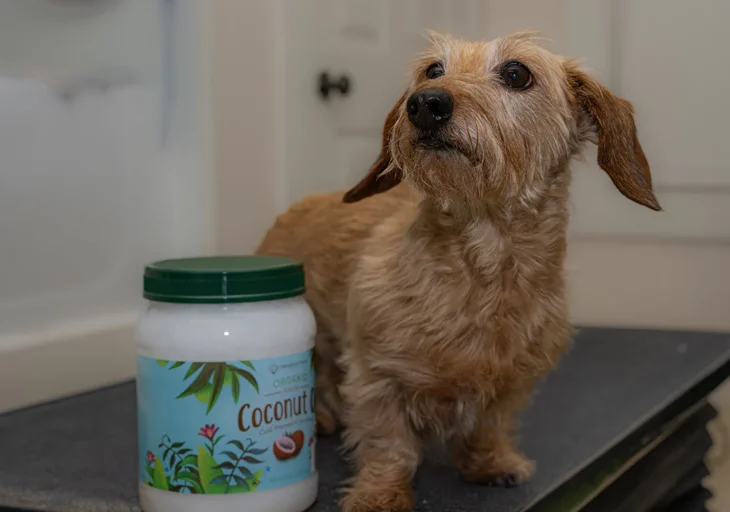
If your dog is constantly scratching, biting, or licking their skin, you’re not alone, and neither is your pup. Itchy skin is one of the most common reasons dog owners end up at the vet. But here’s the good news: not every case needs medical treatment right away. In many cases, especially when the itching is mild or seasonal, you can treat your dog’s skin irritation safely and effectively at home using simple, natural remedies.
Whether the cause is allergies, dry skin, insect bites, or just general irritation, there are proven methods that can offer your furry friend some well-earned relief. And as a pet owner, there’s nothing more comforting than seeing your dog finally relax instead of constantly scratching or chewing.
Table of Contents
Common Reasons Why Dogs Scratch Themselves
When your dog seems itchy all the time, it’s natural to feel concerned. And sometimes, the answer isn’t obvious. One minute they’re fine, and the next they’re gnawing at their paw like it’s the end of the world.
There are a few usual suspects when it comes to canine itching:
- Environmental allergens ─ Just like us, dogs can react to pollen, dust, grass, or mold.
- Fleas or parasites ─ Even one flea bite can trigger intense reactions, especially if your dog is allergic to flea saliva.
- Dry skin ─ Winter air, dehydration, or overbathing can dry out your dog’s skin and lead to flaking and itching.
- Food allergies or sensitivities ─ Certain ingredients, like chicken, beef, soy, or wheat, can cause skin reactions.
- Infections ─ Bacterial or fungal infections often start with itchiness before more serious symptoms appear.
Understanding the root cause helps determine which remedies will be effective. If your dog’s itching is sudden or severe, don’t rule out a quick trip to the vet. But if you’ve seen the pattern before and it’s more of an ongoing issue, you can take safe, practical steps at home.

Oatmeal Baths ─ Gentle and Effective
If you’ve ever had chickenpox or eczema, there’s a good chance someone recommended an oatmeal bath, and there’s a reason. Oatmeal contains compounds like avenanthramides and beta-glucan, which have anti-inflammatory and skin-soothing properties.
For dogs, this old-school remedy still holds up.
Here’s how to do it right: take plain, unsweetened oats and grind them into a fine powder using a blender or food processor. Fill your bathtub with warm (not hot!) water and mix in about a cup or two of the oatmeal powder. Let your dog soak in the bath for 10 to 15 minutes, gently massaging the mixture into their fur.
It’s an easy remedy, but it works surprisingly well. You can repeat this a couple of times a week during allergy season or when your dog’s skin seems particularly dry. Make sure to dry them thoroughly with a towel afterward, and don’t use a hairdryer unless it’s on a cool setting.
Coconut Oil ─ A Natural Moisturizer That Dogs Love
Coconut oil is one of those versatile ingredients that’s not just for baking or smoothies. It’s been used for years in natural skincare, and it turns out, it’s just as good for dogs.
When applied to the skin, coconut oil acts as a moisturizer, helping to calm dry patches, reduce itchiness, and even protect against some types of bacteria and fungi. It’s completely safe to apply directly to your dog’s coat. Rub a small amount between your hands to warm it up and gently massage it into itchy spots.
You can also feed it in small doses, start with about ¼ teaspoon per 10 pounds of body weight per day. Just be cautious not to overdo it, as too much fat can cause digestive issues.
Stick to organic, virgin coconut oil for best results.

Apple Cider Vinegar Spray (But With Warnings)
Apple cider vinegar is one of the most popular home remedies for both humans and pets. Its antifungal and antibacterial properties can help soothe itching caused by yeast overgrowth or minor skin infections.
To use it safely, mix equal parts of apple cider vinegar and water in a spray bottle. Spray the solution onto your dog’s coat or dab it gently onto irritated areas using a clean cloth. Make sure the skin isn’t broken, never use this on open wounds, as it will sting and possibly make things worse.
A lot of pet owners rely on online sources and guides to determine what’s safe and what’s not. But these days, tools like GPTZero are being used more often to check whether content is AI-written or fact-checked, especially when it comes to sensitive topics like pet health.
Diet and Supplements for Skin Health
Skin issues in dogs often start on the inside. If you’ve tried topical treatments and nothing seems to stick, it might be time to take a closer look at what your dog is eating.
Many dogs develop food sensitivities to common proteins like chicken or beef. Some grains and fillers used in low-quality kibble can also trigger allergic reactions. Switching to a limited-ingredient diet, or even a raw or home-cooked one (under veterinary guidance), can help isolate and remove allergens.
Omega-3 fatty acids, found in fish oil supplements, are particularly good for itchy skin. They help reduce inflammation and promote a healthy, glossy coat. Start with a small amount and work your way up, as too much can lead to loose stools.
Probiotics are another helpful addition. A strong gut microbiome supports immune function and reduces skin-related allergies and inflammation.

Grooming and Bathing Habits Matter More Than You Think
Brushing isn’t just about getting rid of loose fur. When done regularly, it helps distribute natural oils across your dog’s coat, preventing dryness and keeping the skin healthier overall.
Depending on your dog’s breed, brushing might be needed once a day or just a couple of times a week. But regardless of how often, be gentle, rough brushing can create micro-tears on sensitive skin and actually make the problem worse.
Bathing also requires a careful balance. Overbathing strips the skin of protective oils, while underbathing can leave behind allergens, dirt, and debris. Aim for once every 3–4 weeks unless your dog is visibly dirty or itchy. Use shampoos that are labeled hypoallergenic, fragrance-free, and made specifically for dogs.
Final Thoughts
Dealing with a dog that won’t stop scratching can feel frustrating and helpless, but you’re far from powerless. With the right knowledge, a bit of patience, and a few items from your kitchen or bathroom, you can make a big difference in your dog’s comfort.
Start with the basics: clean skin, good food, hydration, and regular grooming. Add in a couple of natural remedies like oatmeal, coconut oil, or vinegar spray. Most importantly, keep an eye on changes and trust your instincts. If something feels off, check in with your vet.
Your pup counts on you, and now you’ve got the tools to help.
